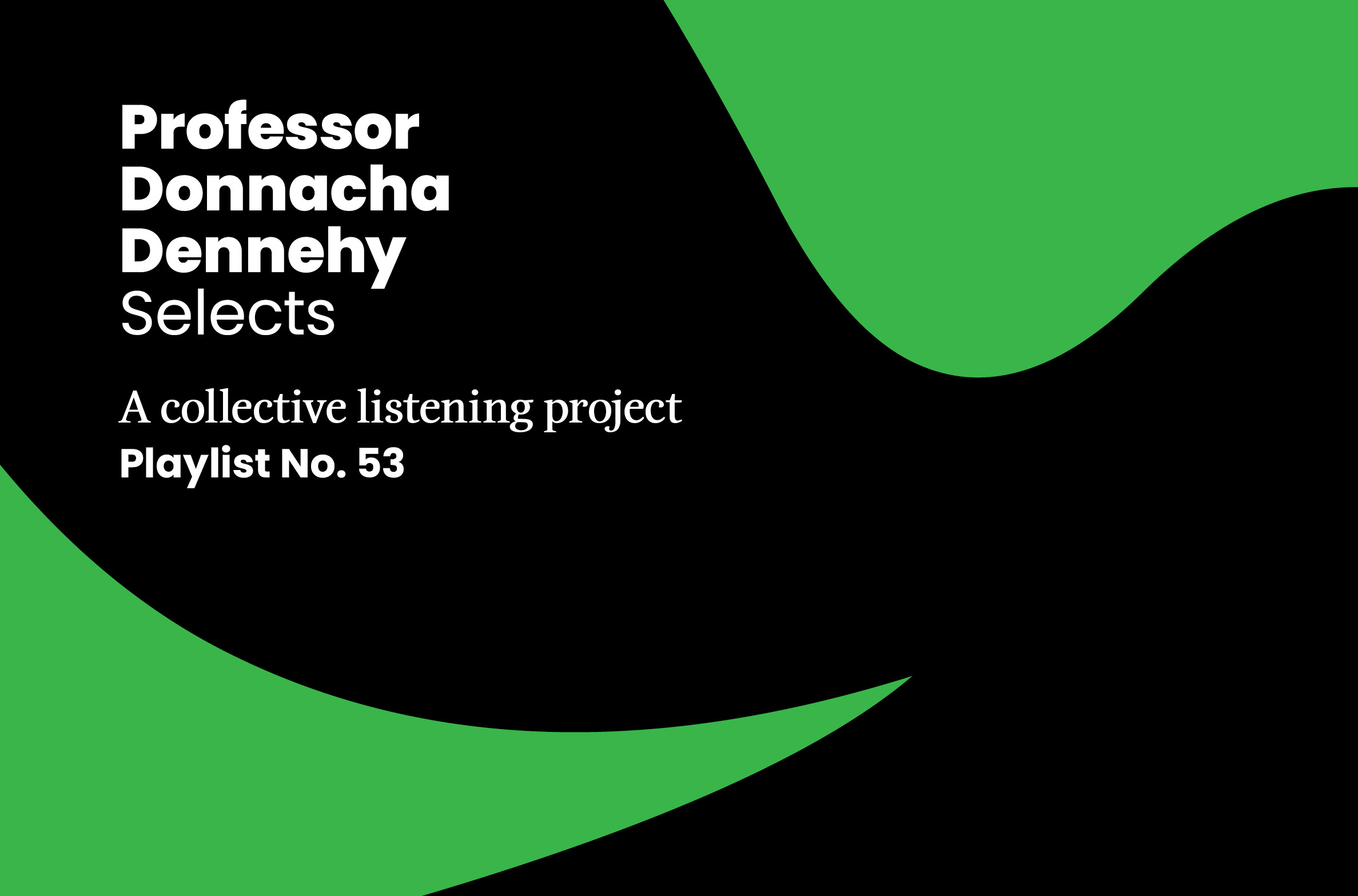Welcome to our 2023-2024 season!
Collective Listening Project
Professor Donnacha Dennehy Selects
Playlist No. 53
About the Playlist
April 15, 2021

This week’s Collective Listening Project celebrates exciting news at the Princeton University Department of Music: Professor Donnacha Dennehy has been awarded a 2021 Guggenheim Fellowship! Many of you may remember Professor Dennehy’s string quartet, Strange Folk, premiered by principal members of the MET Orchestra, as part of Gustavo Dudamel’s residency with us during the 2018–2019 season. The piece, later described as an “energetic tribute to country fiddling” by one reviewer, gave us a taste of his vibrant, Irish folk-infused musical influences. It is fascinating to dive into these influences through the playlist that Professor Dennehy curated for our listening adventure this week, taking us from 15th-century Belgium to present-day Ireland.
There’s a kind of natural flow of energy to this playlist. It starts with one of the most exuberant pieces of music that’s kept me going in the dark days of this pandemic and mainly gets progressively more contemplative, poetic, and elegiac. It lifts again at the end for a kind of transcendent coda by the ecstatic Sufi singer, Nusrat Fateh Ali Khan. I only realize now, that with the exception of the movement from Ligeti’s violin concerto, every piece is vocal! I am very drawn to vocal music at the best of times, but I think that especially now there is something very sustaining about the human musicality of the voice.
SOUMAÏLA KANOUTÉ, TOUMANI DIABATÉ Toumani
We all need joy in our lives, and music is one of the greatest sources of that, even for professional musicians and composers! I saw Toumani Diabaté and his Symmetric Orchestra perform live at Vicar Street in Dublin back in the mid 2000s, and it still ranks as one of the most exciting live events I’ve experienced. Not only is Diabaté a superb kora player, but he also led his large band with such dynamism that the feeling of excitement in collective performance just took the roof off the place! Oh, how nostalgic I am for that collective feeling that comes from live performance right now.
GYÖRGY LIGETI Præludium from the Violin Concerto
This represents another high point of virtuosic music making, both in its composition by Ligeti and in its performance here by the outrageously talented violinist Augustin Hadelich. I have actually just finished a violin concerto especially for Augustin, and I can’t wait for the day that we can hear it in the flesh.
JOHANNES OCKEGHEM Deo gratias
In truth, we don’t actually know if this is by Ockeghem. It’s attributed to him, let’s say, but it’s a phenomenal piece of music. I’m very drawn to pieces that totter on the edge between clarity and overwhelming density. This is from a strange and beautiful disc of similarly over-the-top renaissance choral works, directed by Paul Van Nevel.
LEOŠ JANÁČEK Agneče Božij (Agnus Dei) from Mša glagolskaja (Glagolitic Mass), JW III/9
I love that Janáček only really hit his stride in his 60s. But what a stride it was! Almost everything he produced in old age was a compelling masterpiece, and I am especially enamored of the Glagolithic Mass. It’s sui generis. I remember a stunning performance of this at the Royal Albert Hall in London. Not generally my favorite acoustic, it suited this piece perfectly.
MEARA O’REILLY No. 1 from Hockets for Two Voices
This is from an intriguing and refreshing disc of voice hockets that came out a couple of years ago from Meara O’Reilly. I hadn’t heard of her until this disc, but I can’t wait to hear more from her after this. They are really arresting pieces.
MEREDITH MONK Falling
This is also a recent discovery for me, and I love its visceral swooping quality. It is aptly titled, and I love the connection between the string players and the vocalists—everything feels so tangible and fluid.
SARAH KIRKLAND SNIDER Sanctus–Benedictus from Mass for the Endangered
This is just a scintillatingly beautiful piece from Sarah Kirkland Snider, elegantly and sensitively performed by Gallicantus, led by our own Gabriel Crouch. Sarah shows us that there is much beauty still to be discovered in music.
JOHANN SEBASTIAN BACH “Herr, unser Herrscher” from St. John Passion, BWV 245
I have loved this piece, and this recording of it, for a long time, since I was an undergraduate. It is instantly gripping and yet full of complex detail that yield new secrets every time you listen to it. So much Bach is like that of course. I also really wanted to include something from a recent recording of his Goldberg Variations, but there is only room for so much in a playlist like this.
GUSTAV MAHLER Die zwei blauen Augen von meinem Schatz (The two blue eyes of my love) from Lieder eines fahrenden Gesellen (Songs of a Wayfarer)
In truth, I could have picked any of Mahler’s lieder for voice and orchestra. When I was young, I never had any feeling for Mahler at all. But then that changed drastically in my 30s when I just fell for his music, a feeling that deepens with every year in fact. It’s genuinely one of the really surprising turnarounds in my musical taste. There’s a line in the film Educating Rita where one of the characters declares, “Wouldn’t you just die without Mahler?” I get what she means.
CLAUDE VIVIER Lonely Child
We’ve hit the real elegiac part of the playlist now! I find Vivier an inspiring composer, and this to be probably his most moving piece. An orphan, Vivier never knew his birth parents, and this original loneliness inspires this piece. “Lonely Child” marks a breakthrough in his output and employs his “couleurs” technique, where he adds sum-tones to produce beautiful vertical shadows of sound entirely using conventional instruments.
arr. GAVIN BRYARS Tuirimh Mhic Fhinín Dhuibh (Lament for Black Finn’s Son)
An austerely wondrous rendition of an old Irish sean nós (“old style”) song by Iarla Ó Lionáird, well known to us here in Princeton as a beloved global scholar. My collaborations with Iarla have been some of the most important of my life, but he has of course worked with a dazzling array of composers and other musical artists. This evocative setting for Iarla and viol consort is expertly done by the English composer, Gavin Bryars.
NUSRAT FATEH ALI KHAN Shahbaaz Qalandar (“Red Falcon,” the 13th-century Sufi master)
I love the journeys that the Sufi singer Ali Khan takes us on. His voice surely must be one of the wonders of the world. I am glad that it lives on in so many recordings. This is a live recording taken from the WOMAD Festival in England. It has a kind of transcendent trajectory and seems like a fitting coda to this playlist.



